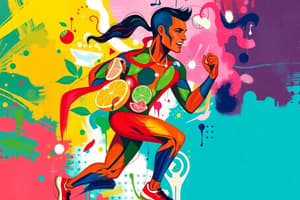Podcast
Questions and Answers
What is a key nutritional adjustment for masters athletes as they age?
What is a key nutritional adjustment for masters athletes as they age?
- Decrease calcium
- Increase vitamin D (correct)
- Increase iron
- Increase protein intake
Which of the following is NOT a type of vegetarian diet?
Which of the following is NOT a type of vegetarian diet?
- Pescetarian
- Ovo
- Lacto
- Carnivore (correct)
What are complementary proteins for vegetarians typically combined with?
What are complementary proteins for vegetarians typically combined with?
- Legumes with nuts/seeds (correct)
- Grains with animal products
- Legumes with fruits
- Grains with other grains
Which nutrient intake is recommended to be decreased for masters athletes?
Which nutrient intake is recommended to be decreased for masters athletes?
When managing social aspects of nutrition, which of the following is important for college athletes?
When managing social aspects of nutrition, which of the following is important for college athletes?
Which population does NOT require special nutritional considerations?
Which population does NOT require special nutritional considerations?
What is a key characteristic of Type 1 diabetes?
What is a key characteristic of Type 1 diabetes?
What should diabetic athletes consume during long-duration exercise every 30 to 60 minutes?
What should diabetic athletes consume during long-duration exercise every 30 to 60 minutes?
What is the recommended daily caloric intake increase for pregnant athletes?
What is the recommended daily caloric intake increase for pregnant athletes?
Which statement is true regarding Type 2 diabetes?
Which statement is true regarding Type 2 diabetes?
What is a common symptom of diabetes?
What is a common symptom of diabetes?
What is a critical B vitamin for pregnant athletes that aids in DNA synthesis?
What is a critical B vitamin for pregnant athletes that aids in DNA synthesis?
Which item is NOT recommended for a diabetic athlete to have available during exercise?
Which item is NOT recommended for a diabetic athlete to have available during exercise?
Which of the following statements about diabetes and exercise is correct?
Which of the following statements about diabetes and exercise is correct?
What is the recommended daily intake of vitamin C for pregnant athletes?
What is the recommended daily intake of vitamin C for pregnant athletes?
What percentage of diabetes cases does Type 2 diabetes constitute?
What percentage of diabetes cases does Type 2 diabetes constitute?
Which health risk is NOT associated with diabetes?
Which health risk is NOT associated with diabetes?
What factor can help monitor caloric intake during pregnancy?
What factor can help monitor caloric intake during pregnancy?
How many additional grams of protein are recommended for pregnant athletes daily?
How many additional grams of protein are recommended for pregnant athletes daily?
What should athletes with diabetes primarily follow for nutritional guidance?
What should athletes with diabetes primarily follow for nutritional guidance?
Which of the following is a sign of hypoglycemia that athletes need to monitor?
Which of the following is a sign of hypoglycemia that athletes need to monitor?
What is the recommended increase in vitamin A intake for pregnant athletes?
What is the recommended increase in vitamin A intake for pregnant athletes?
Which food source is NOT recommended for increasing magnesium intake for pregnant athletes?
Which food source is NOT recommended for increasing magnesium intake for pregnant athletes?
What is the daily iron requirement for pregnant athletes?
What is the daily iron requirement for pregnant athletes?
What should children and teen athletes prioritize in their caloric intake?
What should children and teen athletes prioritize in their caloric intake?
What is the calcium recommendation for children and teens aged 9 to 18 years?
What is the calcium recommendation for children and teens aged 9 to 18 years?
Which of the following is NOT a reason athletes should avoid alcohol?
Which of the following is NOT a reason athletes should avoid alcohol?
What is the primary purpose of magnesium in pregnant athletes?
What is the primary purpose of magnesium in pregnant athletes?
What is a key nutritional consideration for college athletes regarding meal planning?
What is a key nutritional consideration for college athletes regarding meal planning?
Flashcards
Type 1 diabetes
Type 1 diabetes
A type of diabetes where the pancreas doesn't produce enough insulin, typically diagnosed in children and young adults.
Type 2 diabetes
Type 2 diabetes
A type of diabetes where the body's cells don't respond properly to insulin, most common in middle-aged and older adults.
Hyperglycemia
Hyperglycemia
High blood sugar levels.
Hypoglycemia
Hypoglycemia
Signup and view all the flashcards
Diabetes & Exercise (Type 1)
Diabetes & Exercise (Type 1)
Signup and view all the flashcards
Diabetes & Exercise (Type 2)
Diabetes & Exercise (Type 2)
Signup and view all the flashcards
Symptoms of Diabetes
Symptoms of Diabetes
Signup and view all the flashcards
Pre-exercise glucose guidelines
Pre-exercise glucose guidelines
Signup and view all the flashcards
Vitamin A for Pregnant Athletes
Vitamin A for Pregnant Athletes
Signup and view all the flashcards
Magnesium for Pregnant Athletes
Magnesium for Pregnant Athletes
Signup and view all the flashcards
Iron for Pregnant Athletes
Iron for Pregnant Athletes
Signup and view all the flashcards
What do children and teens need for athletic performance?
What do children and teens need for athletic performance?
Signup and view all the flashcards
Calcium for Children and Teens
Calcium for Children and Teens
Signup and view all the flashcards
Iron for Children and Teens
Iron for Children and Teens
Signup and view all the flashcards
Meal Planning for College Athletes
Meal Planning for College Athletes
Signup and view all the flashcards
Why Athletes Avoid Alcohol
Why Athletes Avoid Alcohol
Signup and view all the flashcards
Diabetic Athlete Exercise & Carbohydrates
Diabetic Athlete Exercise & Carbohydrates
Signup and view all the flashcards
Diabetic Athlete Exercise: Examples
Diabetic Athlete Exercise: Examples
Signup and view all the flashcards
Hypoglycemia in Athletes
Hypoglycemia in Athletes
Signup and view all the flashcards
Pregnant Athlete Caloric Needs
Pregnant Athlete Caloric Needs
Signup and view all the flashcards
Protein Requirements for Pregnant Athletes
Protein Requirements for Pregnant Athletes
Signup and view all the flashcards
Folate for Pregnant Athletes
Folate for Pregnant Athletes
Signup and view all the flashcards
Monitoring Caloric Intake for Pregnant Athletes
Monitoring Caloric Intake for Pregnant Athletes
Signup and view all the flashcards
Calorie Needs After Graduation
Calorie Needs After Graduation
Signup and view all the flashcards
Vegetarian Protein Intake
Vegetarian Protein Intake
Signup and view all the flashcards
What are complementary proteins?
What are complementary proteins?
Signup and view all the flashcards
Vitamin D for Vegetarian Athletes
Vitamin D for Vegetarian Athletes
Signup and view all the flashcards
Travel Nutrition for Vegetarian Athletes
Travel Nutrition for Vegetarian Athletes
Signup and view all the flashcards
Study Notes
Special Considerations in Sports Nutrition
- Athletes with specific needs require more dietary adjustments than typical athletes
- Populations with special dietary needs include those with diabetes, pregnant athletes, children and teenagers, collegiate athletes, masters-level athletes, and vegetarians
Diabetes
- Affects approximately 29.1 million people in the United States
- Three-quarters are diagnosed; the remainder are unaware
- A metabolic disease, affecting carbohydrate metabolism
- Causes hyperglycemia, ketosis/ketoacidosis
- Increases risk of heart and kidney disease and causes peripheral nerve damage
- Involves the hormone insulin: a decreased release, or decreased sensitivity to insulin
Diabetes (Types)
- Type 1: Primarily diagnosed in children and young adults, constitutes ~5% of diabetes cases, is insulin-dependent, and requires insulin injections
- Type 2: Most prevalent in middle-aged and older adults, constitutes ~95% of diabetes cases, is non-insulin-dependent. Medicine, diet, and exercise can treat it; insulin may not be required
Common Symptoms of Diabetes
- Excessive thirst
- Excessive urination
- Dehydration
- Unexplained weight loss
- Excessive hunger
- Poor wound healing
- Dizziness
- Headache
- Blurred vision
Diabetes and Exercise
- Type 1: Requires careful self-monitoring of insulin timing, dosage, meal timing, and meal composition
- Type 2: Relatively easier to manage, requires some self-monitoring; insulin may not be required
Pre-Exercise Glucose Guidelines
- Pre-exercise glucose level < 100 mg/dL: Ingest additional carbohydrates (15-40g) prior to exercise.
- 100-250 mg/dL: Safe to exercise.
-
250 mg/dL with ketones: Do not exercise; adjust insulin/medication and retest glucose and ketones. Exercise can be resumed after satisfactory blood glucose and ketones testing.
-
250 mg/dL without ketones: Exercise can be initiated
-
300 mg/dL without ketones: Start exercise with caution.
Signs & Symptoms of Hypo- and Hyperglycemia
- Hypoglycemia: Sweating, pounding heart, hunger, shakiness, confusion, lethargy, incoordination, slurred speech, irritability, headache, nausea
- Hyperglycemia: Nervousness, restlessness, thirst, fatigue, blurred vision, muscle cramps, nausea, abdominal pain
General Nutritional Recommendations for Athletes with Diabetes
- Follow MyPlate food recommendations
- Establish a consistent daily eating schedule
- Consume similar amounts and types of carbohydrates at meals and snacks daily
- Learn best combinations of meal timing, carbohydrate intake, and dosage for optimal blood sugar levels before exercise
Diabetic Athletes and Long-Duration Exercise
- Consume carbohydrates during and after exercise
- Type 1 diabetes: Consume 15-30 grams of carbohydrates every 30-60 minutes during exercise (choices include 8oz of 6-8% sports drink, single serving of sports gel, a fig bar, or 8oz of 1:1 juice to water mix)
Avoiding Diabetic Emergencies
- Closely monitor for hypo- and hyperglycemia
- Keep insulin and syringes available
- Have glucose tablets, juice, or regular soda available
- Educate coaches, parents, and teammates to recognize signs and symptoms
Considerations for Pregnant Athletes
- Competition
- Intensity and volume of exercise
- Physician recommendations
- Dietary recommendations
Special Dietary Concerns for Pregnant Athletes
- Daily caloric intake
- Protein consumption
- B vitamins
- Vitamin C
- Vitamin A
- Magnesium
- Iron
Daily Caloric Intake for Pregnant Athletes
- Additional calories are needed (average 300 kcals/day)
- Range 25 - 800 kcals/day depending on the athlete type and energy expended in training
- Important in the second and third trimesters
- Weight gain (25-35 lbs) can monitor caloric intake
Protein Requirements for Pregnant Athletes
- Protein needs are slightly increased
- Extra 20-25 grams of protein needed daily
- Includes protein-rich foods (skim milk, beef, chicken, fish, beans, lentils, other legumes, nuts)
B Vitamin Requirements for Pregnant Athletes
- Critical for energy production and tissue development, particularly folate
- Needed for DNA synthesis, red blood cell production, and nervous system development
- Recommended intake: 600 µg/day
Vitamin C Requirements for Pregnant Athletes
- Critical for collagen formation, hormone synthesis, and immune function
- Improves absorption of iron
- Increase intake to 80-85 mg/day
Vitamin A Requirements for Pregnant Athletes
- Needed for cell differentiation and immune function
- Increase intake to 750-770 µg (RAE)/day
- Obtain extra from foods: spinach, broccoli, tomato juice, and carrots
Magnesium Requirements for Pregnant Athletes
- Required for muscle contraction and energy production
- Increase by 40 mg to 350-360 mg/day
- Sources overlap with other foods: whole wheat, tofu, yogurt, beans, nuts, fish, spinach
Iron Requirements for Pregnant Athletes
- Required for red blood cell production, oxygen delivery, and energy level
- Increase intake to 27 mg/day
- Sources include beef, poultry, fish, legumes, and iron-fortified grains
- Supplementation might be needed
Nutritional Considerations for Child and Teen Athletes
- Caloric intake must support growth and meet sport needs
- Adequate nutrient intake for "growth channel"
Fluid Requirements for Child and Teen Athletes
- Children are less tolerant of heat
- Reminders to drink fluids are needed
- Improve intake through fluid availability and flavor
Vitamin/Mineral Requirements for Child and Teen Athletes
- Calcium: 1,300 mg/day (ages 9-18)
- Iron:
- 8 mg/day (ages 9-13)
- 11 mg/day (males ages 14-18)
- 15 mg/day (females ages 14-18)
Nutritional Considerations for College Athletes
- First exposure to meal planning required
- Caloric needs may increase
- Create a meal plan; avoid skipped meals
- Avoid alcohol
- Future life after graduation considerations
Why Athletes Should Avoid Alcohol
- Use is banned in some circumstances, can be illegal (by age).
- Safety issues (driving).
- Nutritionally "empty" (poor carbohydrate source).
- Can increase body fat.
- Stimulates appetite.
Preparing College Athletes Nutritionally for Life After Graduation
- Calorie needs will likely decline.
- Maintain nutritional self-care skills, including meal planning, cooking, grocery shopping, and alcohol intake management.
- Manage business/social life, including dining out and travel nutrition.
Special Considerations for Masters Athletes
- Altered caloric needs
- Altered vitamin and mineral needs (decrease in chromium and iron, increase in vitamin D, calcium, magnesium)
- Chronic diseases
- Food–drug interactions
Special Considerations for Vegetarian Athletes
- Plant-based diet
- Types of vegetarians (semi, pesco, lacto-ovo, lacto, ovo, vegan)
- Protein intake (complementing)
- Vitamin D and B12 intake
- Zinc, calcium, and iron intake
- Eating out on the road
Complementing Proteins for Vegetarians
- Combining certain foods to ensure a balanced intake of essential amino acids (e.g., grains and legumes, legumes and nuts/seeds)
Vegetarian Dining Resources
- Online resources to locate vegetarian restaurants (e.g., Vegetarian Journal, etc.)
Studying That Suits You
Use AI to generate personalized quizzes and flashcards to suit your learning preferences.
Related Documents
Description
Test your knowledge on nutritional considerations for athletes, especially focusing on masters athletes and those with diabetes. Learn about dietary adjustments, types of vegetarian diets, and the nutritional needs of pregnant athletes. This quiz covers essential facts about managing nutrition for various athlete populations.




